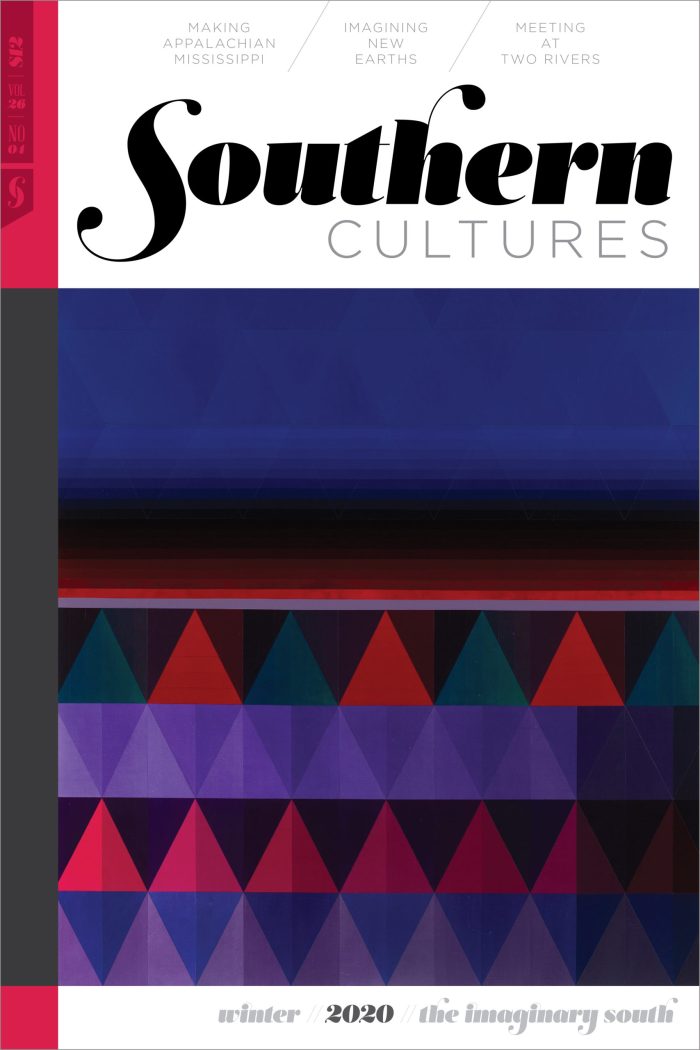From an old wooden swing, Zulayka Santiago heard the over-revving of another truck speeding down the main road in front of her house. It was a not-too-warm day in May 2020, and we were at the tail end of our nearly hour-long interview. We tried to escape the noise by sitting near the treehouse where she hosts meditation classes. Taking coronavirus precautions, we couldn’t go indoors, so we kept our distance outside, masks off.
Her eyes widened at the truck’s roar and she interrupted what she was saying to turn toward the busy road. Ever since she and her family landed here at Earthseed Land Collective, forty-eight acres in Durham, North Carolina, co-owned by herself and six other Black and Latinx people, Zulayka said she’s been taking opportunities to embrace not only the challenges of building deep, lasting collaborations with fellow Earthseed members, but also confronting mundane disruptions of her mostly quiet life here.
“It is so important to me to choose what I focus my attention on,” she said, turning back towards me, “so even in the midst of all that noise and chaos, [Earthseed] continues to be a sanctuary for the frogs, for the dragon flies, for the birds, for me.”
The frogs are particularly vocal. Their songs—at least four, by Zulayka’s count—pitched loud and steady through each of my conversations with Earthseed’s members.
In Octavia Butler’s two-part novel series, Parable of the Sower and Parable of the Talents, Earthseed is a religion established by the young Black protagonist Lauren Olamina in the midst of the social collapse of the United States. This dystopia corresponds with ecological devastation, slavery, serial epidemics, and mass privatization, which results in cities made up of separate walled communities. Earthseed as a religion, and Acorn as a community cofounded by Olamina after the collapse, represent an attempt not only to survive dystopia, but also to build the relationships to other people, to nonhumans, and to the land itself necessary for survival beyond Earth.
If Butler’s fictive religion wants its adherents “to live and thrive on new earths,” Earthseed Land Collective is committed to developing the relationships and practices necessary for thriving lives here, on renewed earths. Earthseed took its name from the Parable series because of the members’ mutual love for Butler’s work.
“We knew that we wanted to have land, that’s the one thing in the beginning that we were sure of,” said Justin Robinson (pronounced Robison), a member of Earthseed. “We all sort of had that aspiration separately, and then, coming together, we were able to look at this fictionalized future [in the Parable series] and be able to see some parallels for us. And even if nothing about that future comes true, this [land collective] is still necessary.”
“We are holders of space where people of color can come and get free and feel safe.”
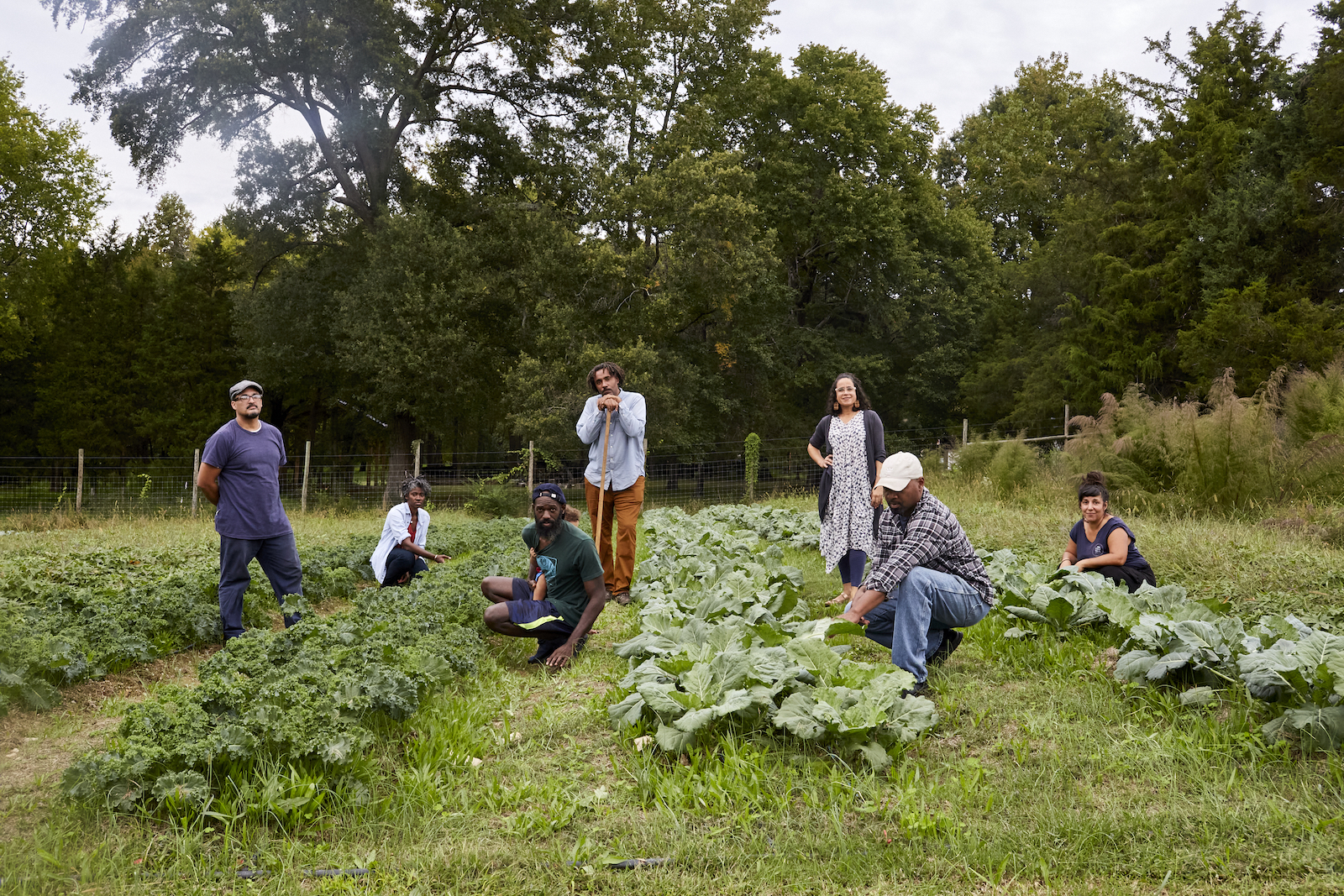
The Earthseed Collective was founded in 2012, and besides the land itself, its members had different personal reasons for its creation. For Justin, a teacher, botanist, and musician, it was, at least in part, a way to figure out Black people’s relationship to land in the US. For Zulayka, a nonprofit consultant and mindful outdoor experience guide, it was community building. For Courtney Woods, a public health scholar, professor, and capoeira practitioner, it was building better relationships to land and sustainability. For Santos Flores, a youth educator and capoeira practitioner, it was the desire to move away from a farming system where Black and Brown people were still being used to build white wealth. For Corre Robinson, an investor and research consultant, it was building an alternative to individual wealth. For Tahz Walker and Cristina Rivera Chapman, both farmers, it was an opportunity to cultivate healthy, nourishing land that couldn’t be taken by landlords. The reasons dovetail and diverge, but all center around aims that would be difficult to achieve individually.
“We are holders of space where people of color can come and get free and feel safe,” Courtney said. “We’re helping ourselves reconnect and to understand that there’s no separation between us and the natural world.”
Much like Butler’s fictional Acorn and the real-life Black communities of the nineteenth century, Earthseed has an air of fugitivity. It does not announce itself with signs or arrows; it is not for public consumption. When I arrive on its vast, sunny acres, Earthseed feels like a friend’s home—the children play in the grass, one of the family dogs runs up to greet me, there are always vegetables that need tending or taking home. It is also a community sanctuary; local Black and Brown and queer folks like me often find themselves here, connecting with each other at a gathering, at the farm, or at a ceremony.
“I feel different on the land than when I’m out in Durham,” Santos said. “It’s like there’s a magic force field. It’s a place where I feel more held, to make more mistakes, to be more transparent with my vulnerability. I hope that sentiment becomes normal for other people who come to the land.”
People come to Earthseed for about as many reasons as it was founded. There are capoeira practices outdoors, walking meditations on trails that intersect with tributaries of the Eno River. On a day I was there, the members’ children were having bomba drumming lessons. Justin hosts botany classes and can identify just about everything growing all around, cultivated or wild.
In some ways, Tierra Negra Farm is at the center of Earthseed’s origin story. After rebuilding the farm on several different rental properties, Tahz and Cristina were determined to find more stable land tenure. “Clearly in some ways it’s a lot easier just to think about, ‘I’m going to do this on my own and get my own piece, and be like the king of my own domain,’” Tahz said. “But it takes different kind of work, a different kind of muscle, to build with people and to be accountable to people and to build a different kind of a social network, so I think [collective landownership] was a draw.”
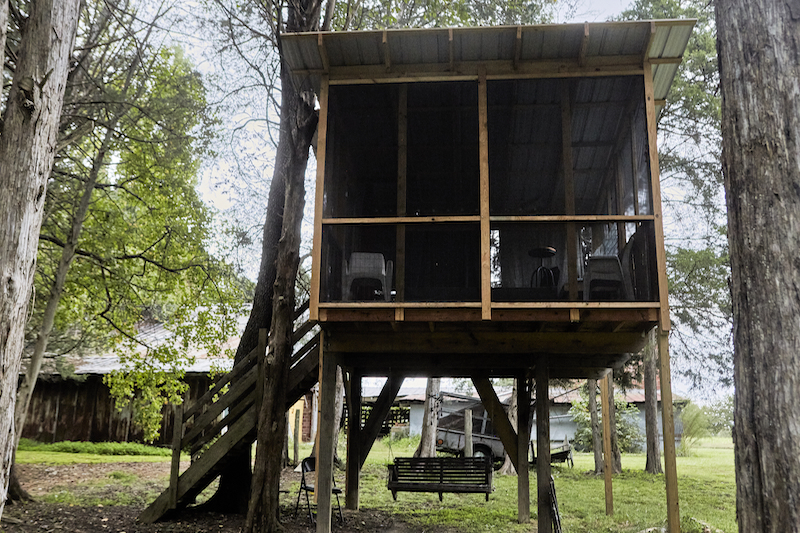
“It takes different kind of work, a different kind of muscle, to build with people and to be accountable to people and to build a different kind of a social network.”
The group came together in 2012 through various social connections, all related to land. Tahz and Cristina met at a farming conference when Tahz was working on multiple farms in North Carolina and Cristina was working on a farm in New York City. Tahz was connected to everyone else through his work building the sanctuary garden at a former spiritual practice and social justice strategy center called The Stone House in Mebane, North Carolina, and through his work at SEEDS, a nonprofit garden school for youth in Durham, North Carolina. At its largest, Earthseed was eleven people—four have departed the collective over the years for other pursuits.
Inspired by a talk given by an elder and local Black farmer, Bernard Obie, Tahz co-organized an initial meeting of interested people with cultural organizer Nia Wilson of SpiritHouse North Carolina. At the meeting, they learned about the intentions of collective work and honoring land histories from Vivette Jeffries-Logan, a cultural organizer and member of the Occaneechi Band of the Saponi Nation, an Indigenous group from North Carolina’s Piedmont region. From there, they met on a regular basis to organize the collective and to identify where they would land.
“And so those original meetings, it was just meeting after meeting after meeting and lots of looking at properties … we went, like, rural rural, forty minutes outside of Durham, to Mangum Street downtown in terms of possibilities,” Zulayka said. “And then we all got tired and kind of went quiet for a little while.”
Four years after the collective’s first meetings, a white family in Durham County, about a fifteen-minute drive from downtown, was selling their farm, which had been in the family for four generations. Zulayka and Corre were looking for a larger home.
“This [property] felt like a ‘Let’s just look at it. It’s way above our price range, and they could never …’ and we did,” Zulayka said. They bought twelve acres with two houses, a studio, workshops, and storage. Zulayka and Courtney carried the mortgage, with plans to place the land formally under collective ownership in the future.
And then the same family asked the collective if they would be interested in purchasing the remaining thirty-six acres. If not, they warned, there would be a high possibility that a developer would take it over. “So we had just finished like, ‘Yay! We did it! Twelve acres! Woohoo!’ And then it was like, ‘Can we do this other thing?’” Zulayka said. “And Justin was one of the [members of the group saying] ‘Hell no, we can’t! We’re barely trying to figure out how we’re gonna pay for what we got.’ But it was this beautiful click click click alignment of things.”
One of those alignments was with the sellers, who sold the land at a reduced price to preserve their family’s stewardship and keep it away from developers. Another was with the Triangle Land Conservancy, which worked with Earthseed to arrange a conservation easement to protect the two tributaries on the thirty-six acres. The easement further reduced the purchase price, since no development would be allowed, and the land was theirs by November 2016.
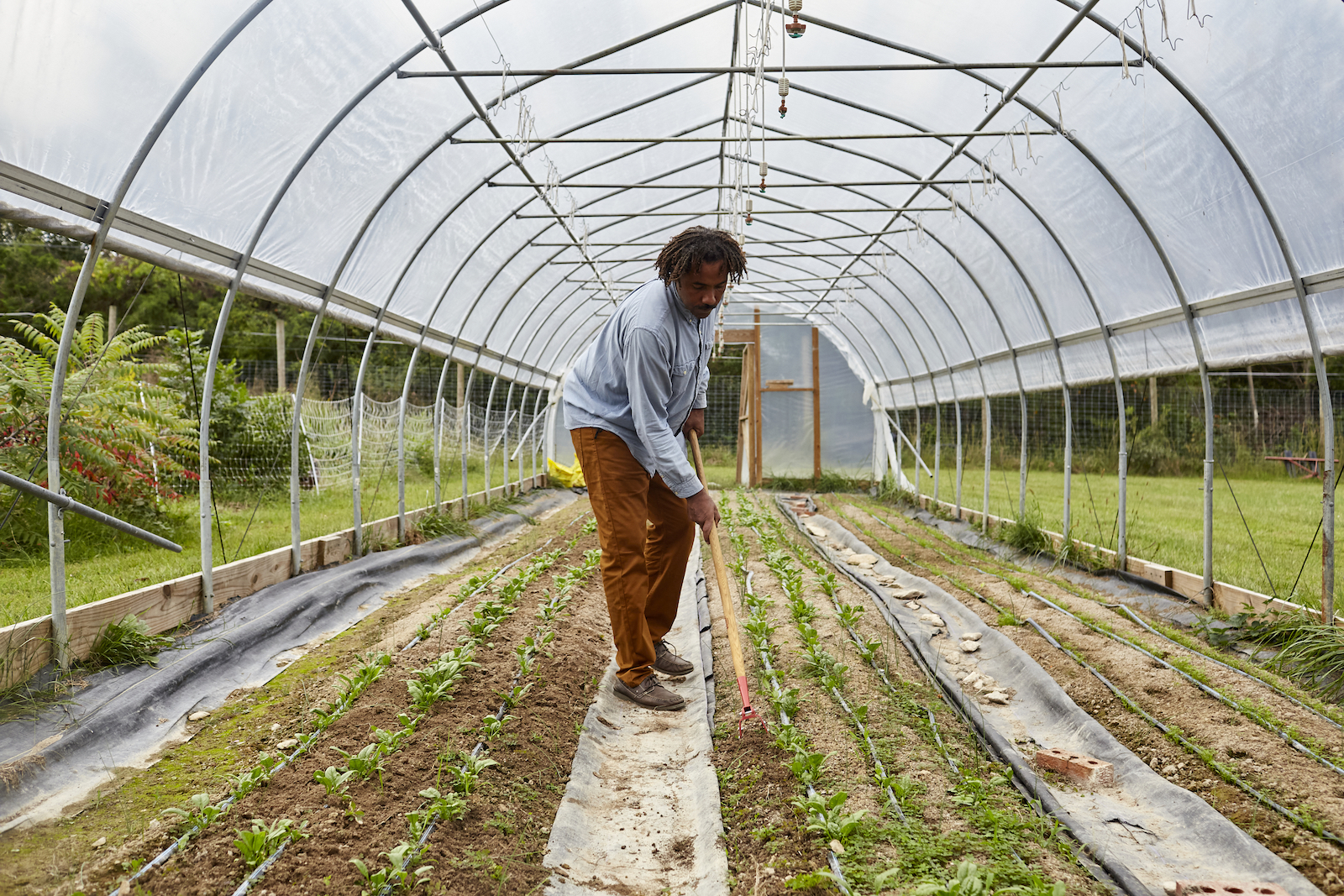
Four years later, in the midst of a pandemic, economic crisis, and a global uprising against anti-Blackness and capitalism, Earthseed represents a version of the alternative world Octavia Butler imagined; the collective is hard at work to maintain it, and its mission—”to remember and reimagine our relationship to ourselves, each other and the land in pursuit and practice of collective liberation.”
“[There is] a practice in Chile called ‘La Minga,’ which literally means collective work for the collective good,” Cristina said. “[La Minga] is an Indigenous practice that folks still use, both in a farming context and in a general ‘we gotta live together’ context. And as I have tried different avenues to participate in a [transformed] food system, there’s just so much clarity that the sense of belonging and sense of connection is integral to doing the work, which is hard work. And that doesn’t mean that it’s not joyful, but it’s hard.”
Earthseed is a refuge from the constraints of being in public right now. It is a relief to breathe fresh air, unmasked, to be able to hold a conversation without the impulse to hold my breath. To move my body without arrows directing my path. To witness the abundance of nourishing food and life growing all around.
Earthseed is a refuge from the constraints of being in public right now. It is a relief to breathe fresh air, unmasked. To witness the abundance of nourishing food and life growing all around.
But well before the coronavirus shutdown, Earthseed was already sought after by many groups wanting to create their own vision of Black liberation. “There’s the Black Dirt [Farm] Collective in the mid-Atlantic, there’s four to five people in Atlanta who don’t have a name for their group yet, there’s a group called Co-fed … young people in cooperatives who’ve done their meetings here for the last three years. [W]e do meals, and they use the barn as meeting space and they camp out,” Tahz said. “After COVID-19, there’s going to be an onslaught of collectives that are going to be growing, and I think we’ll find ourselves in a place to be able to support those collectives as they grow.”
Being at Earthseed feels like the good kind of freedom, even as it raises important questions about what it means for land to be free. Justin has been sitting with that question for years. He’s one of three Earthseed members with family land going back generations in South Carolina: his mother’s family owns land in Chester; Courtney grew up on her family’s land in Darlington; and Corre spent summers at family reunions in Hartsville.
“Being landowners, that’s participating in a colonial system that takes Indigenous rights out of the thing. [Black people] are allowed to participate in it, and Indigenous people were often not,” Justin observed. “And so we’re landowners—my mother’s family is landowners, I’m a landowner, what does that mean in the context of all that land that is stolen and we get to have a piece of that stolen land?” Earthseed presents an opportunity for the collective to reckon with that question, he says, even if the ultimate answer is unclear.
For Courtney, part of reckoning with Black folks’ relationship to land is also about creating places where Black people can be safe. “I definitely imagined living back on land, like in the same way that I grew up, where I could run to my grandma’s house,” she said. “There are public lands, parks, but some of the research I’ve done is about why Black folk don’t feel safe in the woods and places like that.”
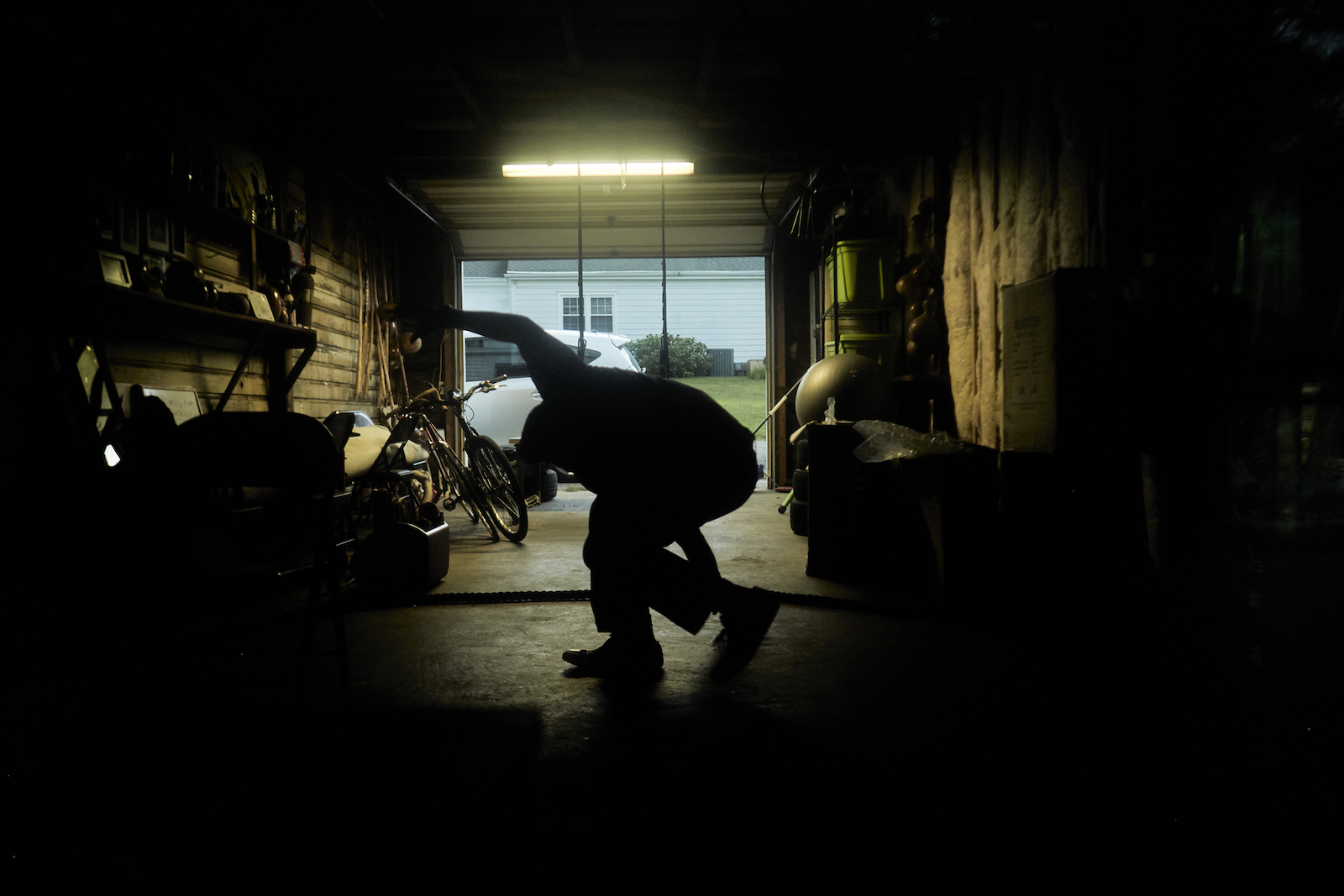
These macrotensions around Black safety, land sovereignty, and freedom extend into the collective’s internal questions about their commitments to one another as they operate with differing life experiences and priorities, while trying to interrupt the harms of bootstrap individualism and capitalism. Corre compares the process to Buckminster Fuller’s biosphere experiment—trying to create a livable environment while living in it. “We’ve been teasing out our assumptions on a lot of things. Finding a common denominator about how to raise our kids if they’re going to be raised together. What it means to contribute labor versus money to different things, what it means to make a profit or not, who has rights to the things that get started on the land and how to return investments back to the organization. All these things are being worked out in situ, not as an experiment, but as a constantly evolving conversation that never really stops.”
Cristina, who talked with me twice during breaks from the farm, recalled how group discussions about money brought up questions of trust and power that they had to work through together. “I needed to have that level of trust because the ask to be part of Earthseed was an ask to go into collective debt,” she said. “It’s not a small thing, and there were for sure lots of dynamics and so much shame and also the exceptionalism that some of us experienced having to shed.” She also said that “moving at the speed of trust” within the collective has rearranged her relationship to money as a dominant form of value and power.
Cristina brings the same principles into Tierra Negra’s land share program, where members commit to working on the land and taking food home not as an exchange, but as a form of community building and mutual support. There are hammocks on site where members of the collective can just relax, whenever. “The rest is the work,” she said.
When they started Earthseed, Zulayka read a book on intentional communities and was startled when she saw the statistic that 90 percent of such efforts ultimately fail. But as they got further into their process, she understood much more clearly why the failure rate is so high.
“We’re going against the grain of something that is the air we breathe,” she said. “And so how difficult it is to not constantly default to … not just possession, but like, ‘My individual [self] comes first’—that is lifelong work, and I can’t say that I’m where I wanna be, but [Earthseed] is definitely a practice towards that.”
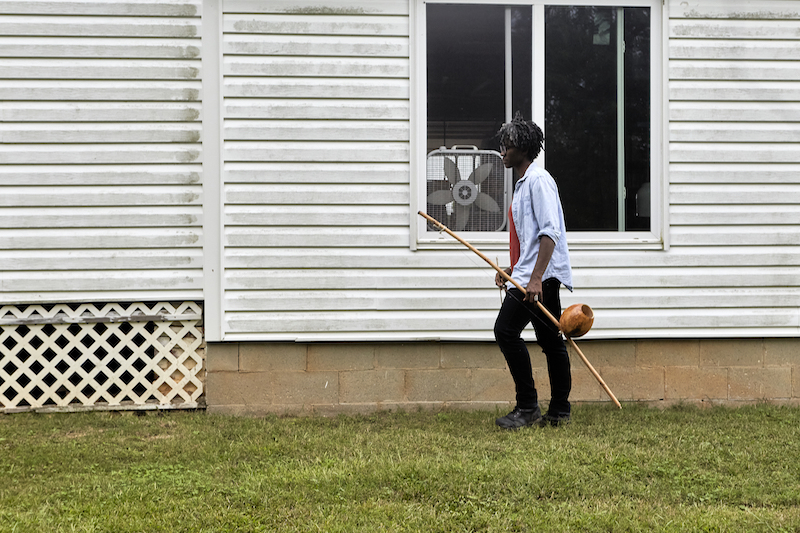
Every time I return to Earthseed, there is something new happening on the land. There’s a barn that has been converted to a community space where I once attended a Sunday morning workshop by two of Earthseed’s original members—Black queer feminist writer, artist, and poet Alexis Pauline Gumbs and multimedia artist, filmmaker, musician, composer, and theologian Sangodare Akinwale. The barn has wall-to-wall windows that let sunlight in like a chapel, and children were running free in and out of the heavy wooden doors as we listened to Akinwale’s message about the power of our own vision. There is now an outdoor classroom built by a crew of Black men called Earth-Bound Building.
When Earthseed is able to reopen for programming, Justin is planning more cooking instruction to teach folks about the transformative space between the farm harvest and the plate. Cristina is cofacilitating the NC Mutual Herb Network for Black Lives and BIPOC Healing, which collects and distributes herbal medicines to organizers, protestors, and any Black people who need it. I spent one warm September afternoon at Tierra Negra Farm with other masked organizers, straining tinctures of milky oats grown on the farm into hand-labeled dropper bottles.
I asked them all about how they see the future of this place, and the visions ranged from building affordable housing for Durham residents displaced by largely white gentrification of the city to letting future generations decide how the land can help them meet the challenges they face.
“We’re moving along one plant at a time,” Corre said. “Just putting plants in the ground and seeing how well they do, and who likes it, and whether it should be there or move to a different spot. The frogs like it, and they let us know, or the deer, they chew it up. That’s kind of where it is right now.”
Whatever Earthseed’s future, Courtney is clear that the relationship-building within the collective will continue to be critical to its survival and to the members’ own growth. “Building trust with one another. That feels like the work. Some of the most important work I’m doing in my life.”
This essay first appeared in the Imaginary South issue (vol. 26, no. 4: Winter 2020).
Danielle M. Purifoy is a writer, lawyer, and assistant professor of geography at the University of North Carolina at Chapel Hill. She serves as board chair of the North Carolina Environmental Justice Network and as the Race and Place editor for Scalawag, a media organization devoted to storytelling and journalism in the South.
The author would like to thank the members of the Earthseed Collective for their generosity in sharing their stories over two visits in May and July 2020. More information can be found at www.earthseedlandcoop.org. All references to Octavia Butler’s Parable series come from Parable of the Sower (New York: Grand Central Publishing, 2019) and Parable of the Talents (New York: Grand Central Publishing, 2019).

